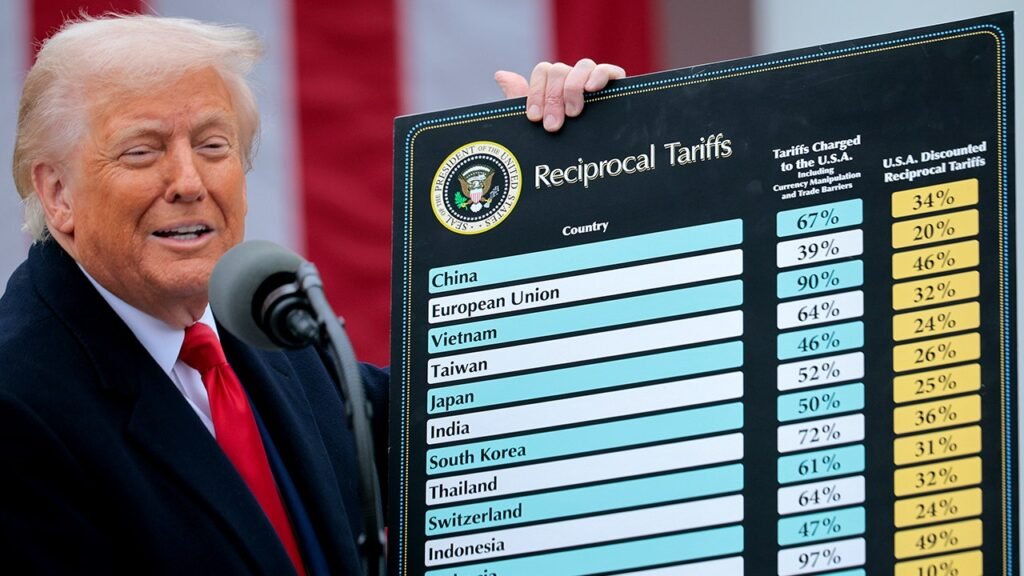The U.S. is in jeopardy of encouraging allied European nations to strengthen ties with China amid President Donald Trump’s new wave of stringent tariffs, according to experts.
The Trump administration announced April 9 it would scale back reciprocal tariffs on other countries for 90 days, but that it would immediately hike tariffs on Chinese goods to 145%. China proceeded to boost its tariffs on U.S. goods to 125%.
The constant flip-flopping on policies will prompt European leaders to edge closer to China, which may be viewed as a more reliable trade partner, said Michael Strain, director of economic policy studies at the conservative-leaning American Enterprise Institute think tank in Washington.
“President Trump’s erratic and punitive trade war is pushing Europe closer to China,” Strain said in a Monday email to Fox News Digital. “European leaders seem to believe that China would be a more stable and predictable economic partner than the United States. This is both remarkable and deeply worrisome. President Trump is isolating the United States.”
HERE’S A CLOSER LOOK AT TRUMP’S TARIFF PLAN: WHAT TO KNOW ABOUT THE NEW DUTIES
It won’t take long for Europe to head into China’s arms on trade — already European nations are moving in that direction, according to Elaine Buckberg, a senior fellow at Harvard University’s Salata Institute for Climate and Sustainability.
“Europe is already turning toward China in light of the Trump administration’s new tariffs,” Buckberg, the former chief economist for General Motors and a former senior U.S. Treasury official, said in a Monday email to Fox News Digital.
Specifically, Buckberg pointed out various recent meetings between European and Chinese officials, including Spanish Prime Minister Pedro Sánchez’s Friday meeting with Xi in Beijing and a video call between Chinese and EU trade ministers April 8. Likewise, EU leaders unveiled plans for a summit in Beijing with Xi in July.
“China has been an important export market for Europe for years, and it will only become more essential given highly uncertain prospects for trade with the U.S. — depending how the U.S. tariffs evolve,” Buckberg said.
Clark Packard, a research fellow on trade studies with the libertarian-leaning Cato Institute think tank, said that instead of choosing to partner with like-minded countries to agree to combat China, the Trump administration has chosen an approach that will “alienate” allied countries. As a result, he said that it wouldn’t surprise him “in the least bit if the tariffs push the European Union specifically toward China.”
Additionally, Packard noted the tariffs’ impact on Asian countries like Japan and South Korea, which announced March 30 they would work with China to bolster regional trade.
“Japan and South Korea responded to the tariffs by explicitly stating they were looking to strengthen ties with Beijing,” Packard said in a Monday email to Fox News Digital. “A similar dynamic will be at play in Europe.”
HOW WE GOT TO LIBERATION DAY: A LOOK AT TRUMP’S PAST COMMENTS ON TARIFFS

Trump and his administration have condemned other countries’ trade practices and accused them of engaging in unfair trade practices against the U.S. The White House has called for tariffs to address the nation’s 2024 record $1.2 trillion trade deficit, and asserted that the tariffs will revive U.S. manufacturing jobs.
“President Trump is a master dealmaker, and over 75 countries are working to negotiate trade deals that better serve American farmers and workers,” White House spokesperson Anna Kelly told Fox News Digital on Tuesday. “He will continue to hold China accountable for decades of unfair trading practices until they agree to come to the table.”
Trump unveiled historic tariffs in a ceremony at the White House’s Rose Garden for a “Make America Wealthy Again” event April 2.
The tariff plan laid out a baseline tax of 10% on all imports to the U.S., coupled with customized tariffs for countries that place higher tariffs on U.S. goods. The baseline tariffs of 10% took effect April 5, while the others took effect Wednesday at midnight.
However, Trump pivoted April 9, and said the reciprocal tariffs would remain paused for 90 days. In the interim, those countries except for China will only face the baseline 10% tariff.
Read the full article here
